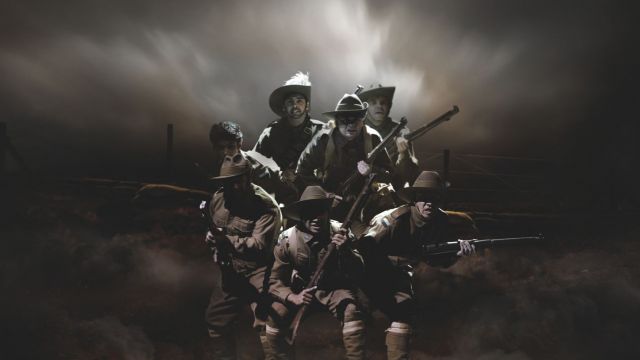Black Diggers
Story of Sacrifice and Injustice Impacts Adelaide Festival Audiences.
The phrase ‘Lest We Forget’ has such poignant meaning that it is held sacred by us all as a recognition of sacrifice in war. In its fine ensemble piece Black Diggers the Queensland Theatre Company infuses the phrase with more layers, not only in terms of recognising indigenous soldiers who died in war, but also with the need to acknowledge that shameful post-war discrimination against returned aboriginal servicemen occurred. It is a part of our history that Australian society must learn from and never forget.
Black Diggers is told in multiple scenes and begins in Australia at the start of World War 1. Its war narrative is drawn from the archived diaries and letters of young indigenous men, who, like most young Australian males of the time, wanted to make a contribution at the front, even if it meant lying about their ages.
Struggling against prejudice, the naïve indigenous teenagers were often ingenious in securing a place amongst their white peers and soon became accepted by their fellow Australian soldiers. After bravely dealing with the horrific realities of war, those who survived hoped they’d return to a more inclusive Australia, only to be disappointed. Mates in war did not necessarily mean being accepted by other white Australians on returning home. Instead, segregation and blatant racism remained. In some cases, indigenous soldiers’ own land had been taken over in their absence.
Written by Tom Wright and directed by Wesley Enoch (The Sapphires, The 7 Stages of Grieving, Stolen, The Story of the Miracles at Cookie’s Table, RiverlanD and Black Medea), Black Diggers has an all-male, all-indigenous cast. They include George Bostock, Luke Carroll, Shaka Cook, Trevor Jamieson, Kirk Page, Guy Simon, Colin Smith, Eliah Watego and Tibian Wyles.
There is fine work by all actors and it would be unfair to single anyone out from the ensemble. Actors play multiple roles, smoothly moving from Aboriginal soldier to German infantryman, from white officer to mother or father of a soldier… and more.
Monologues are highlights of individual actors’ performances, graphically and intimately portraying the state-of-mind of young men struggling against the overwhelming physical conditions and psychological impacts of war. In particular, a monologue by a dead soldier describing his final terrible moments is riveting.
 There are scenes of savage violence in Black Diggers as well as great poignancy, but despite the solemn content there is frequent humour. A number of songs also help break the dramatic tension and showcase the voices of the cast.
There are scenes of savage violence in Black Diggers as well as great poignancy, but despite the solemn content there is frequent humour. A number of songs also help break the dramatic tension and showcase the voices of the cast.
Stephen Curtis’s simple set, with its raised platform and sparse props, is ideal in denoting the environments in which the action takes place. They include a recruitment office, a soldier’s home, Aussie pubs and the trenches of Gallipoli, to name a few of the multiple scene settings.
The blackboard-like set walls are covered by chalk markings, which are added to by the cast throughout the play using gradually fading white paint. Amongst a range of uses, the paint denotes the names of European theatres of war in which indigenous Australians served.
Sound designer and composer Tony Brumpton creates an emotive soundscape, including the noise of shells landing in the trenches, while Ben Hughes’ excellent lighting design adds to the realistic atmosphere of the killing fields. Ruby Langton-Batty’s costumes are superbly authentic.
In Black Diggers’ powerfully emotive final scene the cast paint the background with a list of the names of many indigenous men from our home state, men from history who made the ultimate sacrifice for all Australians.
As Bugler David Khafagi sounds The Last Post the audience is left with much to ponder indeed.
Lest We Forget.
Lesley Reed
Images: Branco Gaica. Adelaide Festival of Arts.
Subscribe to our E-Newsletter, buy our latest print edition or find a Performing Arts book at Book Nook.

